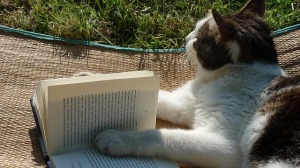15 Interesting Facts about Reading for International Literacy Day
Interesting facts about literacy and reading in honour of International Literacy Day
In honour of International Literacy Day on 8 September, we’ve put together fifteen of our favourite facts about literacy and reading. Some are funny, some are surprising, and some are shocking; but all, we hope, are interesting in some way. This post might be considered a sequel to our previous post comprising 10 great quotations for International Literacy Day.
Reading for just six minutes a day can reduce stress by 68%.
‘Bibliotherapy’ is ‘the use of reading matter for therapeutic purposes’.
In 1879, Charles J. Dunphie published a book called Sweet Sleep: A Course of Reading Intended to Promote That Delightful Enjoyment.
All my good reading, you might say, was done in the toilet. – Henry Miller
Joseph Conrad, author of Heart of Darkness, avoided reading reviews of his work and instead measured them with a ruler. The longer the review, the better he felt about it.
On days when he gave public readings from his novels, Charles Dickens had two tablespoons of rum with fresh cream for breakfast, and a pint of champagne for tea.
A 1993 study concluded that 23% of American adults were functionally illiterate.
My personal hobbies are reading, listening to music, and silence. – Edith Sitwell
A study of 1995 found that 85% of young people who appear before the juvenile courts of the US are functionally illiterate.
A 2009 study found that 63% of American adult prisoners are illiterate.
In a recent survey of 2,000 people, it was found that 26% of readers lied about having readGeorge Orwell’s Nineteen Eighty-Four.
A man ought to read just as inclination leads him; for what he reads as a task will do him little good. – Samuel Johnson
At the Chatterley trial in 1960, when Penguin Books was put on trial for publishing Lady Chatterley’s Lover by D. H. Lawrence, the prosecuting lawyer asked the jury if it was ‘a book that you’d even wish your wife or your servants to read’.
Someone who is ‘omnilegent’ has read everything, or is familiar with a great amount of literature.
H. L. Mencken came up with a word for people who read too much: ‘bibliobibuli’. (As if there is such a thing as reading too much!)
Why can’t people just sit and read books and be nice to each other? – David Baldacci
J. R. R. Tolkien and C. S. Lewis held competitions to see who could read the longest excerpt of ‘bad’ romantic novelist Amanda McKittrick Ross without laughing.
B. S. Johnson’s 1969 novel The Unfortunates was published as a box full of unbound pages which the reader could put together in any order.
Canadian intellectual Marshall McLuhan thought readers should turn to page 69 of any book to determine whether it’s worth reading.
If you enjoyed these facts about reading, you might also enjoy our 30 interesting facts about books.


No comments:
Post a Comment